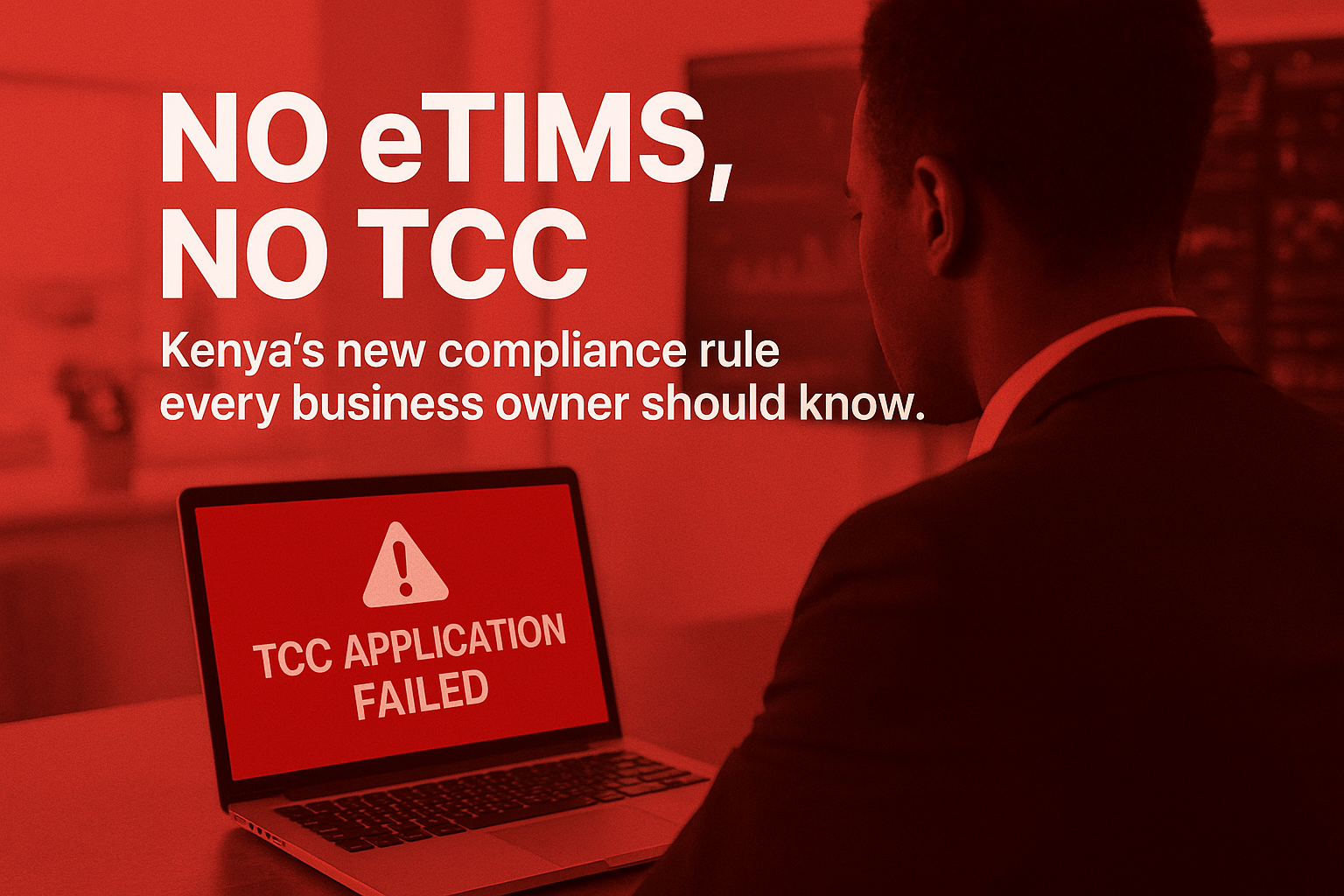e-TIMS Kenya Explained: A Complete Guide for Kenyan Businesses on KRA’s New System
The landscape of tax compliance in Kenya has undergone its most significant transformation in recent memory. The Kenya Revenue Authority (KRA) has moved decisively to digitize tax invoicing through the electronic Tax Invoice Management System, or e-TIMS. This is not a minor update or a simple replacement for the old ETR (Electronic Tax Register) machines. It is a fundamental shift in how KRA monitors business transactions in real-time.
For many Kenyan business owners, CEOs, and finance managers, e-TIMS has introduced a wave of questions, uncertainty, and urgent compliance demands. The system, which captures and transmits sales data directly to KRA’s servers, is at the heart of the government’s strategy to enhance revenue collection, broaden the tax base, and seal loopholes that have historically led to revenue leakage.
Understanding e-TIMS is no longer optional; it is a core requirement for business survival and sustainability in Kenya. Failure to comply doesn’t just risk penalties—it directly threatens your company’s profitability by disallowing essential business expenses. This guide provides a complete, authoritative breakdown of what e-TIMS is, who it affects, the critical deadlines, and the step-by-step actions you must take to ensure your business is 100% compliant.
What is e-TIMS and Why is KRA Implementing It?
At its simplest, e-TIMS (electronic Tax Invoice Management System) is a system developed by KRA to allow businesses to issue and transmit electronic tax invoices in real-time (or near real-time) to the tax authority.
This system represents a major evolution from the previous ETR system. While ETR machines recorded sales, they were physical devices that only transmitted data periodically. This created a lag and opportunities for invoice manipulation or non-issuance. e-TIMS closes this gap entirely. Every time a compliant business generates an invoice, a digital copy is simultaneously validated and stored by KRA.
The primary objectives behind KRA’s mandatory rollout of e-TIMS are clear:
- Enhance Tax Compliance: By having a real-time view of all transactions, KRA can easily verify VAT declarations and income tax returns against actual sales data. This is a core part of modern tax compliance.
- Minimize Tax Fraud: The system makes it incredibly difficult to use fake invoices to claim fraudulent VAT refunds or inflate expenses, a common tax evasion tactic.
- Broaden the Tax Net: e-TIMS provides KRA with unprecedented visibility into sectors of the economy that were previously hard to tax, bringing more businesses (formal and informal) into the tax base.
- Simplify Filing (for Compliant Taxpayers): In the long term, KRA aims to use the data collected to pre-fill VAT and income tax returns, simplifying the filing process for businesses that are fully compliant.
For the taxpayer, the most visible feature of a valid e-TIMS invoice is the QR code. This code, when scanned, allows anyone (including the customer) to instantly verify the invoice’s authenticity against KRA’s database, confirming that the transaction has been declared.
The e-TIMS Deadline: Are You Compliant?
The urgency surrounding e-TIMS stems from the strict deadlines imposed by KRA. Initially rolled out to VAT-registered taxpayers, the scope of e-TIMS was dramatically expanded.
KRA mandated that all businesses, including those not registered for VAT, must onboard onto the e-TIMS platform. The final deadline for this nationwide onboarding was March 31, 2024.
As of today, any business operating in Kenya that has not integrated with e-TIMS is considered non-compliant. This is not a trivial administrative lapse; it carries severe financial consequences that can cripple a company’s operations and profitability. If your business is still not on e-TIMS, you are already accumulating significant tax risk and penalties with every single transaction you make. You can use tools like our Compliance Checker to get a quick assessment.
Who Must Comply with e-TIMS? (Hint: It’s Everyone)
This is the single most misunderstood aspect of e-TIMS. Many business owners initially believed, “I am not registered for VAT, so this does not apply to me.”
This assumption is incorrect and dangerous.
KRA has been explicit: All persons conducting business in Kenya must be on e-TIMS. This includes:
- Companies (Limited, Partnerships, etc.)
- Sole Proprietors
- Freelancers and consultants
- Informal businesses (“Jua Kali” sector)
- Landlords (for rental income)
- Service providers (lawyers, accountants, doctors, etc.)
- Online businesses and digital content creators
The rationale is no longer just about VAT. It is about Income Tax. KRA is now using e-TIMS to get a complete picture of the economy. By mandating that all businesses issue e-TIMS invoices for their sales, KRA creates a verifiable data trail. This trail is then used to verify the expenses claimed by other businesses.
This leads to the most critical impact of the new system.
The Most Critical Impact: Non-Deductible Expenses
If the compliance deadline doesn’t command your attention, this will:
The Finance Act 2023 introduced a seismic shift in tax law. It amended the Income Tax Act to state that for a business expense to be considered deductible for tax purposes, it must be supported by a valid e-TIMS invoice.
Let’s break down what this means in simple, stark terms:
Scenario: Your company pays Ksh 500,000 for a marketing campaign. The marketing agency gives you an old-fashioned paper invoice, not an e-TIMS-compliant one.
Result: When you file your annual tax returns, KRA will disallow that Ksh 500,000 as a deductible expense. Your taxable profit will be artificially inflated by Ksh 500,000, and you will pay corporate tax (e.g., 30%) on that amount.
In this case, your failure to get a valid e-TIMS invoice just cost your business Ksh 150,000 in extra taxes.
Now, apply this principle to every single expense your business incurs:
- Rent
- Utilities (water, electricity)
- Supplier materials
- Professional fees (legal, audit and assurance, etc.)
- Repairs and maintenance
- Software subscriptions
- Transport and logistics
If any supplier you pay is not on e-TIMS, the expense you paid them is not claimable. This makes compliance a matter of survival. It’s not just about your sales; it’s about the validity of all your expenses. This change forces the entire business ecosystem to comply, as non-compliant businesses will be shunned by clients who cannot claim their invoices.
Understanding the Different e-TIMS Solutions
KRA has provided several solutions to cater to different types of businesses. You don’t necessarily need to buy a new machine. The solutions are primarily software-based:
1. e-TIMS Client (Mobile & PC)
This is a downloadable software solution that can be installed on computers (Windows) and mobile phones (Android and iOS). It is ideal for small and medium-sized businesses that issue a moderate number of invoices and want a dedicated application.
2. e-TIMS Online Portal
This is a web-based solution accessible through the KRA e-TIMS portal. It is designed for businesses offering services or with a low volume of transactions (e.g., consultants, landlords, freelancers) who do not need a complex system. They can simply log in and generate invoices as needed.
3. Virtual Sales Control Unit (VSCU)
This solution is for businesses that already have an advanced accounting system, ERP (Enterprise Resource Planning), or Point of Sale (POS) system. The VSCU is an API (Application Programming Interface) that “plugs into” your existing system. It allows your software to communicate directly with KRA’s e-TIMS server, transmitting invoice data automatically in the background. This is the most seamless solution for established businesses.
4. Online Sales Control Unit (OSCU)
This solution is similar to the VSCU but is designed for businesses that operate in environments with unstable internet connectivity. It allows for the local recording of invoices and subsequent transmission to KRA when a stable connection is established.
Choosing the right solution depends on your business’s size, transaction volume, and existing technology.
A Step-by-Step Guide to e-TIMS Onboarding
If you are not yet compliant, you must act immediately. Here is the general process:
Step 1: e-TIMS Onboarding on iTax
- Log in to your KRA iTax profile.
- Under the “e-TIMS” tab, select “Onboard” and follow the prompts.
- You will need to provide details about your business and the e-TIMS solution you intend to use.
Step 2: Await KRA Credentials
- After successful registration, KRA will send you your e-TIMS credentials, including a username and password, typically via your registered iTax email.
Step 3: Download, Install, or Integrate
- For e-TIMS Client: Use the credentials to download and install the software on your device (PC or mobile).
- For Online Portal: Use the credentials to log in to the web portal.
- For VSCU: Work with your software provider and a certified tax compliance advisor to integrate the API with your ERP or POS system. This is a technical step and should not be attempted without expert help.
Step 4: Configure and Test
- Set up your system with your company details and product/service items.
- Generate a test invoice to ensure it transmits correctly and you can see a valid QR code.
Step 5: Train Your Team
- Your finance, sales, and administrative staff must be trained on how to issue e-TIMS invoices correctly. This is a critical step; issuing a faulty invoice is as bad as not issuing one.
- Ensure they understand the importance of capturing the correct customer KRA PIN, as this is essential for the other party to claim the expense.
The Penalties for e-TIMS Non-Compliance
The penalties for ignoring e-TIMS are severe and multi-layered:
- Non-Deductibility of Expenses: As detailed above, this is the most financially damaging penalty. It directly increases your tax bill by invalidating your legitimate business costs.
- Failure to Issue e-TIMS Invoices: KRA can penalize businesses Ksh 10,000 per invoice that is not issued through the e-TIMS system.
- General Non-Compliance: KRA has a range of other penalties for failing to comply with tax laws, which can include fines and, in extreme cases, prosecution.
The message is clear: the cost of non-compliance far outweighs the cost of setting up the system.
How e-TIMS Impacts Your Bookkeeping and Audits
The e-TIMS era transforms bookkeeping and auditing.
The New Standard for Bookkeeping
Your bookkeeping team can no longer simply accept a paper receipt or invoice. Their first check must be: “Is this supported by a valid e-TIMS invoice?”
- Real-Time Reconciliation: Your books must now be reconciled against the e-TIMS data KRA holds. Any discrepancy is a red flag.
- Data Accuracy: The “Garbage In, Garbage Out” principle is more critical than ever. A typo in a KRA PIN or invoice amount can create a compliance nightmare.
- Digital Record-Keeping: This accelerates the shift away from paper. Your bookkeeping must be digital, secure, and integrated.
Preparing for a KRA Audit
With e-TIMS, KRA can conduct “audits” remotely and automatically. They can run a report comparing the sales you declared in your VAT return against the sales data transmitted via e-TIMS. They can compare the expenses you claimed in your income tax return against the e-TIMS invoices you received from suppliers.
- Any mismatch is an automatic trigger for a deeper audit and assurance query.
- Your defense is no longer a stack of paper files; it is a perfectly reconciled digital ledger.
- This makes having a professional, meticulous audit and finance team, whether in-house or outsourced, more critical than ever.
How Adamjee Auditors Ensures Your Business is e-TIMS Ready
Navigating this new digital tax landscape can be daunting. The technical requirements of API integration, the staff training, and the strategic financial implications are complex. This is where expert guidance becomes invaluable.
At Adamjee Auditors, we are not just accountants; we are your strategic partners in compliance and growth. We provide end-to-end solutions to get your business e-TIMS compliant and optimized.
1. Expert Tax Compliance & Advisory
We cut through the confusion. Our team of tax experts will assess your business, identify the correct e-TIMS solution for you, and manage the entire onboarding process. We ensure your business is 100% compliant with all KRA regulations, protecting you from penalties. Explore our tax compliance services.
2. Seamless System Integration and Training
If you run an ERP or POS system, our technical partners can manage the VSCU API integration seamlessly. More importantly, we provide practical Adamjee Training for your staff, ensuring they understand how to use the system correctly, preventing costly human errors.
3. Strategic CFO Advisory
e-TIMS has strategic implications. Our CFO advisory services help you beyond basic compliance. We analyze your new data to find efficiencies, manage cash flow in this new environment, and ensure your entire financial strategy is aligned with Kenya’s digital-first reality.
4. Flawless Bookkeeping and Audit
Our bookkeeping services are built for the e-TIMS era, ensuring every transaction is verified and compliant. This makes your annual audit and assurance process smooth and provides you with accurate data you can trust to make decisions. Find more insights in our articles.
Don’t let e-TIMS be a source of stress. View it as an opportunity to digitize, streamline, and professionalize your financial operations with a trusted partner.

Frequently Asked Questions (FAQs) about e-TIMS
What is the difference between e-TIMS and the old ETR?
ETR was a physical machine that recorded sales and transmitted data in batches. e-TIMS is a software-based system (or integration) that transmits invoice data to KRA in real-time, instantly validating it.
I am not registered for VAT. Do I still need to be on e-TIMS?
Yes, absolutely. KRA requires all businesses to be on e-TIMS to issue invoices for their sales, regardless of VAT status. This is to ensure their sales can be a valid deductible expense for their customers.
What if my internet is unstable?
KRA has provided solutions like the e-TIMS Client and OSCU, which can capture sales offline and transmit them once a stable connection is available.
What do I do if a supplier gives me an invoice without an e-TIMS QR code?
You must reject it and request a valid e-TIMS invoice. If you accept and pay it, you will not be able to claim that payment as a business expense, and it will cost you money in extra taxes.
I am a freelancer. How do I comply?
The simplest solution for freelancers and consultants is the e-TIMS Online Portal. You can log in, generate a professional invoice for your client, and be fully compliant.
Partner with Kenya’s Trusted Tax & Compliance Experts
The era of ambiguity in tax is over. e-TIMS is the new standard, and compliance is not negotiable. The businesses that thrive will be those that embrace this change, digitize their operations, and build robust financial systems.
Trying to navigate this alone is a risk. Partnering with experts is a strategy. Ensure your business is not just compliant, but competitive.
Get Expert Financial & Audit Guidance Today
Navigating Kenya’s financial and regulatory landscape can be complex. Don’t leave your company’s compliance to chance. Let our experts at Adamjee Auditors provide the clarity and support you need.
Contact us today for a consultation on our comprehensive audit, tax, and advisory services.
NAIROBI OFFICE
Park View Heights, Mombasa Road, Floor M3
Contact us: +254 750 053 053
Email: madamjee@adamjeeauditors.co.ke
MOMBASA OFFICE
Suite 401, Motorwalla Building,
Jomo Kenyatta Road
Contacts us: +254 717 908 241
Email: info@adamjeeauditors.co.ke
We are social. Let’s chat!
Serving Clients Across Kenya:
Kitale, Nairobi, Malindi, Kilifi, Embu, Narok, Nyeri, Nakuru, Eldoret, Naivasha, Voi, Lamu, Kajiado, Mombasa, Watamu, Garissa, Kisumu, Thika, Kakamega, Meru.




